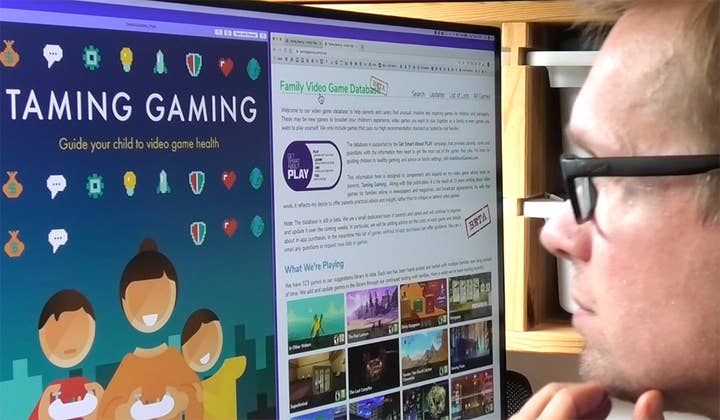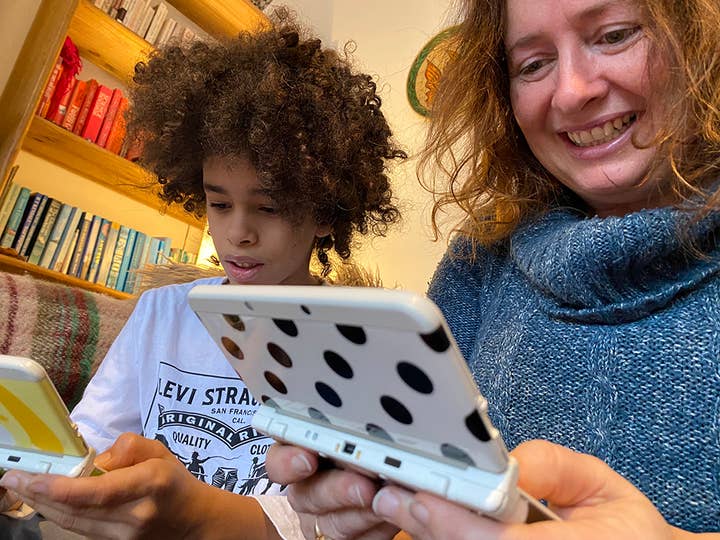Getting parents into games with Netflix-style lists
Andy Robertson shares how his Family Video Game Database can educate non-gamers by using a more accessible language
For all the advances video games have made in attracting broader audiences, there's one demographic that's always important to continue reaching out to: parents and carers.
Over the decades, the games industry has gone to great lengths to educate those with young children about the content of its products, the potential risks involved in online play, the availability of parental controls, and so on.
Yet, there is still concern around the way kids engage with video games, whether it's the ongoing notion that they're all addicted to Minecraft/Fortnite/[Insert popular game here] or that they're being manipulated by predatory monetisation mechanics.
Efforts to educate parents about video games have been numerous over the years, such as marketing and awareness campaigns like the Get Smart About Play initiative by UK trade body UKIE.

But the key to reaching caregivers, says journalist and upcoming author Andy Robertson, is to speak their language.
"Parents and carers have different questions about video games than an avid or enthusiast player," he tells GamesIndustry.biz. "It's possible to direct them to many of the amazing other sites about games but [it] can be hard to get past the jargon and naturally assumed knowledge of the reader."
Robertson is currently demonstrating his approach with the beta version of his Family Video Games Database. This site offers detailed listings for more than 370 games across all platforms, but it doesn't just force users to scroll through alphabetically.
Instead, Robertson has taken care to list video games by themes and topics that non-gamers might understand better than the typical genre and mechanic language that those already engaged with the hobby are familiar with.
For example, rather than listing shooters and RPGs -- both terms that may not be entirely clear to those new to gaming -- there are categories of games such as 'compete on the couch', 'solve a mystery' or 'embrace silliness.' There are even lists for helping children find games appropriate for them, including one he is working on that offers alternatives to players "too old for Fortnite but too young for Call of Duty."
The system is similar to how Netflix groups films in a way designed to pique users' interest -- such as 'films to watch with your mother' or 'quirky British comedies' -- giving people a sense of what the games might be about without relying on prior knowledge of how they work.
"The database has been built with these lists as an integral element," says Robertson. "You can browse the new lists, or game pages tell you what lists that game is in and what other games you might also like."
"Parents and carers have different questions about video games than an avid or enthusiast player. It can be hard for them to get past jargon and naturally assumed knowledge"
The lists also make the database a place to discover new games, rather than solely learn how to enjoy them safely.
"If you have a certain number of people who want to play, and have one particular system, and a limited amount of time, how do you find the ideal game?" says Robertson. "The database lets you search by these things to discover games that families are unlikely to have heard of. Particularly smaller indie games.
"Also, if your child wants to play a game and you check the ratings to find it's not appropriate, the database suggests other games of different age ratings to try instead. Or maybe there was a game you loved in your family - if you search for that game, the database will then suggest eight or nine similar games to try."
Another core element is the inclusion of age ratings, something Robertson notes is "less of a focus" for other sites. He highlights IGDB, as an example, which has incorrect or confusing ratings on some listings, or Common Sense Media, which offers its own rating that can conflict with ESRB or PEGI. Other resources, like RAWG.io, MobyGames and Wikipedia, don't include age ratings at all.
For his database, Robertson checks every game for both PEGI and ESRB rating. Digital-only game ratings are gathered from stores such as Google Play, the App Store, or Nintendo eShop, and if a game has no rating, this is also made clear.
"We also note how the in-game purchases work and how to save money buying special editions or up-front packs," Robertson says. "We get this information by checking all the digital stores and publisher websites for the game.

"Finally we add a hand-picked screenshot, a YouTube video that starts at the precise point in the video parents need to see, and information about duration and number of players all on a single page makes it much easier for parents and carers to get the information to make an informed decision."
Of course, the database is not the first initiative to try and educate parents about video games. Making the information available is the easy part; it's actually reaching parents and carers that presents the biggest challenge, if only because some are largely ignorant of the industry's activities.
"The best way to guide a child who loves video games is to play with them and also find games to play yourself."
"There are some parents and carers who are quite easy to engage with, and there are others that are less attuned to this part of a child's life," says Robertson. "The challenge is helping them grow in understanding and literacy about what games are on offer. This not only helps them engage with their child's hobby but to play a role in guiding and expanding it, rather than just trying to put the brakes on.
"The best way to understand something is, of course, to try it. The best way to guide a child who loves video games is to play with them and also find games to play yourself.
"This advice sounds absurd to busy parents and carers. But the games in my 'your first video game' list have reliably got many people over this hurdle and helped them join the ranks of those that play games."
The database is based on Robertson's upcoming book, Taming Gaming, which breaks down 60-plus video game recommendations into a simpler format that non-gamers will understand. Like the book, the database is predominantly his own work -- albeit with the help of a web developer friend on the actual execution -- but Robertson has also been sourcing lists and suggestions from the gaming community.
He has even worked with other parties on specific lists. Mental health organisation Gaming The Mind assisted with a collection of games entitled 'space for grief,' while a group called Love Thy Nerd collaborated on the 'be a good neighbour' list. There's even a 'commit no violence' list I worked on with Robertson, inspired by my personal project Non-Violent Game of the Day.
Robertson has also received support from UKIE, which has made the database part of its Get Smart About Play campaign to put it in front of more parents and carers. And when the COVID-19 pandemic struck, the trade body helped accelerate the site's development.

"When we entered this period of isolation, it was clear that the database would be a really helpful tool for families," Robertson explains. "However, it wasn't ready for launch. With UKIE's support, we were able to fast track the database to be able to share with families in its beta format, as well as create some lists of games specifically for the situation -- 'great games that are also educational', 'games that provide calm', 'game about being a good neighbour', and 'games to keep you active'."
Robertson continues to expand the database, and is open to submissions from developers and publishers -- or indeed anyone else interested in games. He is also talking to accessibility experts about recommending games for those who live with different disabilities, likely to be the formation of yet more helpful lists.
"I keep a list of games to add, and that is well stocked as you can imagine," he says. "I get suggestions from people who read the database or see a list that they think needs a particular addition. I've had some great suggestions from [the] industry as well. Autonauts, for example, is a game I wouldn't have heard of myself but was contacted by the publisher to include it.
He concludes: "Along with suggestions, I'm looking for publishers or developers who want to have a game featured on the site, to help us cover some of the development and ongoing costs... My hope is that with some support from publishers who'd like games to be featured on the database, we will be in a position to launch a finished 1.0 version of the site by the end of June. With thousands of families already reading the information, it's clear there's an appetite, and that this information makes a difference."
Disclaimer: James Batchelor worked with Andy Robertson on one of the lists featured on the Family Video Game Database. This was uncompensated and unconnected with his work for GamesIndustry.biz.

